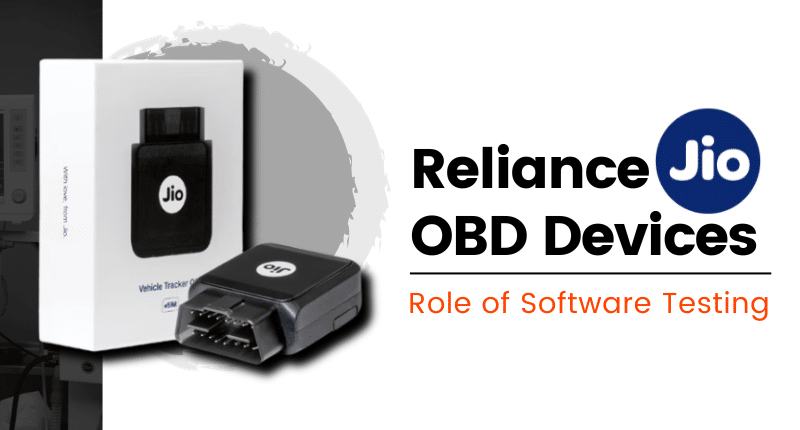The Reliance Jio OBD device plays a critical role in the Jio Connected Car platform. It collects data from the vehicle’s onboard computer and transmits it to the Jio cloud. It supports various user services, including real-time traffic updates, vehicle diagnostics, and remote vehicle control.
To ensure the reliability and security of the Reliance Jio OBD device, comprehensive software testing is essential. This involves testing the device’s software, its integration with other systems, and its performance.
Here are some key areas of focus for software testing of the Reliance Jio OBD device:
1. Functional Testing:
We need to verify that the device fulfills its requirements. Such as collecting data from the vehicle’s onboard computer, transmitting data to the Jio cloud, and interfacing with other systems.
2. Performance Testing:
Evaluating the device’s performance under different conditions, including various vehicle speeds, network conditions, and user loads, is crucial to ensure it meets real-world needs.
3. Security Testing:
It’s essential to check the device’s security measures to safeguard against unauthorized access and attacks. This includes testing authentication, authorization mechanisms, encryption, and vulnerability to known security exploits.
Conducting thorough software testing is vital to guarantee the Reliance Jio OBD device’s reliability, security, and ability to meet user requirements. This is fundamental for providing a positive and secure connected car experience.
Additionally, here are specific examples of software tests for the Reliance Jio OBD device:
- Test the device’s data reading capability from the vehicle’s on-board computer. This involves simulating the vehicle’s onboard computer and sending various data types. It helps the device to ensure proper data parsing and transmission to the Jio cloud.
- Test the device’s data transmission to the Jio cloud by simulating the cloud environment and assessing the device’s ability to authenticate and securely send data.
- Evaluate the device’s integration with the vehicle’s infotainment system. This includes testing the device’s ability to provide real-time traffic updates to the infotainment system’s display.
- Test the device’s integration with the driver’s smartphone by connecting it to the smartphone. Also ensuring it can communicate and send vehicle diagnostic information to the smartphone’s app.
- Assess the device’s performance under diverse conditions, including varying vehicle speeds, network conditions, and user loads. The device should maintain reliable data transmission even in high-speed travel or weak network connections.
- Perform security tests to protect the device from unauthorized access and potential attacks. It includes simulating different attack scenarios, such as man-in-the-middle attacks and denial-of-service attacks, and ensuring the device can detect and prevent these security threats.
Conclusion
The Reliance Jio OBD device serves as a critical component of the Jio Connected Car platform, enabling the collection and transmission of vital vehicle data to the Jio cloud. To ensure the device’s reliability and security, rigorous software testing is imperative. We’ve highlighted key areas of focus, including functional, performance, and security testing.
Furthermore, we’ve explored specific software tests, such as data reading, transmission, integration, performance assessment, and security evaluations, which are essential to address various aspects of the device’s functionality and security.
By conducting these comprehensive software tests engineers can help ensure the Reliance Jio OBD device remains dependable, secure, and responsive to the evolving needs of users. This commitment to thorough testing and ongoing improvement is pivotal for providing an optimal connected car experience, enhancing user satisfaction, and maintaining a strong focus on safety and security.




